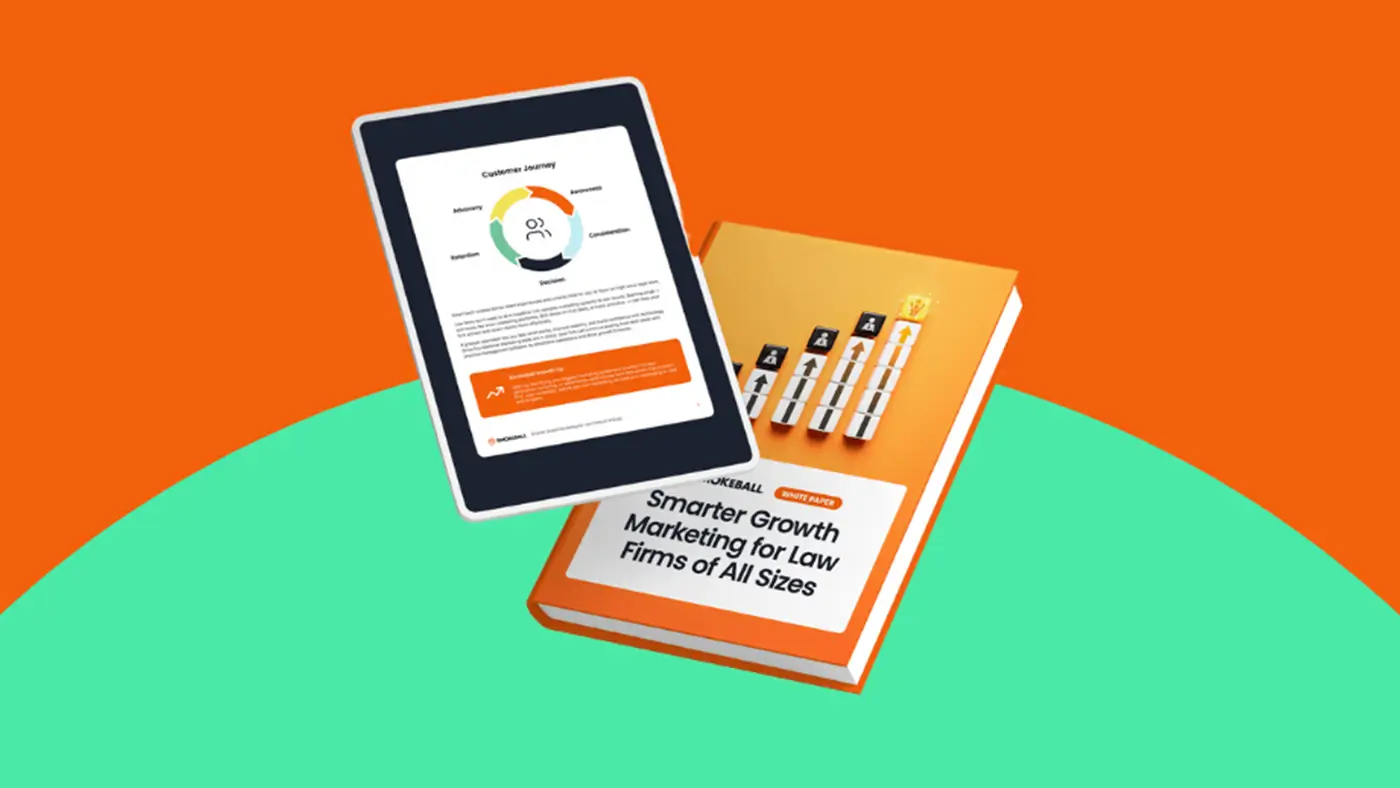Optimize Your Law Firm Website Conversion Rates: Speed, SEO, and Smarts to Win Clients
Written by
|
June 1, 2025
Written by Smokeball
|
June 1, 2025

Written by Jordan Turk
|
June 1, 2025

Your law firm’s website shouldn’t feel like an online brochure collecting dust. It should be your hardest-working legal professional — answering questions, scheduling consults, and converting late-night “do I need a lawyer?” Google searchers into actual paying clients.
Here’s how to turn your static homepage into a lead-generating, tech-savvy machine — one that’s built to thrive with today’s smartest digital strategies and tomorrow’s legal-tech innovations.
The Need for (Website) Speed
Why It Matters: If your website takes longer to load than it takes to microwave popcorn, you’ve got a problem. According to Digital Silk, every extra second of load time cuts website conversions by up to 20%.
Quick Fixes:
- Compress large images (your lawyer headshots do not need to be 12MB). Compression reduces the file size without noticeably affecting image quality, so your site loads faster without looking pixelated.
- Minify your code and scripts. That means cleaning up unnecessary spaces, line breaks, and duplicate code in your site’s HTML, CSS, and JavaScript—making it easier for browsers to load your pages quickly.
- Run a free scan with Google PageSpeed Insights and tackle their recommendations one by one. Think of it as a wellness check for your website and an important part of a broader site health review.
PRO TIP: A faster website doesn’t just please visitors, it can also improve your search rankings. Speed impacts both search engine optimization (SEO) and user experience, two major factors as firms embrace more client-centered tech.
Mobile Responsiveness: Your Pocket-Sized Billboard
Here’s the deal: Over 60% of people searching for legal services do it on mobile. If your site doesn’t work smoothly on a phone, you're losing clients faster than you can say “billable hours.”
Quick Fixes:
- Use responsive design. That’s fancy talk for building your website so it automatically adjusts to fit any screen size, whether it’s a phone, tablet, or desktop. No pinching, no zooming, just smooth scrolling and easy reading every time.
- Check your site’s mobile-friendliness with Google’s test tool.
Mobile-friendly design isn’t just a nice-to-have, it’s a key factor that affects your search rankings. In today’s digital age, with AI-powered search engines and more clients searching online first, having a mobile-friendly site is absolutely essential.
Navigation: Don’t Make Them Think Too Hard
The bottom line: If users need a compass to find your “Contact Us” page, your bounce rate is probably as high as your law school GPA.
Best Practices:
- Keep menu labels simple and direct (save the Latin for court filings).
- Make navigation consistent across every page.
- Highlight critical sections like “Practice Areas” and “Reviews.”
This ties directly into 2025’s legal tech trend toward frictionless client experience, and your website is where it all starts.
CTAs That Lead to Law Firm Website Conversions
Why It Matters: A good CTA, or call to action, should encourage profitable behavior. It’s like a friendly nudge from your intake team. A bad CTA? It’s digital tumbleweed.
The Stats: Law firms using AI-driven chat tools (including CTAs that trigger chat) have seen law firm website conversion boosts of up to 30%, according to the ABA.
Quick Fixes:
- Use clear, action-driven language like “Book a Free Consult Today.”
- Repeat CTAs throughout key pages, not just at the bottom.
Chatbots & Live Chat: Your 24/7 Receptionist; Your Client’s Personal Assistant
Here’s the deal: People don’t just search for legal help from 9-5. Adding live chat or an AI chatbot captures leads while you sleep (or argue in court).
The Stats: According to EcommerceBonsai, 55% of businesses say chatbots help them generate high-quality leads. For law firms, this can mean more qualified potential clients reaching out without adding to your staff’s workload.
According to the American Bar Association, law firms are increasingly adopting AI-driven tools to enhance client engagement. These technologies enable 24/7 client interaction, automate routine tasks, and provide timely responses, aligning with the growing expectations for instant, digital-first legal services.
Social Proof: Trust in 10 Seconds or Less
The bottom line: Most clients want proof that you’re the real deal before they even reach out. And video testimonials? They’re pure gold.
Studies show that viewers retain 95% of a message when watching a video compared to just 10% when reading text. Plus, video builds trust faster and keeps visitors on your site longer.
Quick Fixes:
- Feature reviews and testimonials prominently (bonus points for video).
- Add case studies with measurable outcomes to show you walk the walk.
Modern clients want validation, and it’s noted that client expectations are driving firms to prioritize digital trust-building tools — testimonials, case results, and review integrations included.
Analytics: Measure What Matters
Why It Matters: You can’t improve what you don’t track.
Quick Fixes:
- Set up Google Analytics to monitor traffic and conversion behavior.
- Use tools like Hotjar or Microsoft Clarity for click tracking and heatmaps.
This aligns directly with 2025’s legal trend of data-driven decision making. Law firms are increasingly using metrics not just to track marketing but to refine intake and predict case outcomes.
SEO: Show Up or Shut Out
If you’ve heard the term “SEO” tossed around but never looked into it, here’s the quick version: Search Engine Optimization (SEO) is how your website gets found on Google. Without it, your firm might as well be invisible online.
Why It Matters: You could be the best lawyer in the city, but if you’re not showing up on Google, you're basically practicing law in a cave.
The Stats:
- 96% of legal seekers use a search engine.
- 75% never scroll past the first page of search results.
- Only 21% of law firms are investing in content marketing like blogs or webinars — so it’s your wide-open opportunity to stand out.
SEO Must-Haves:
- Location-based keywords ("Phoenix personal injury attorney").
- Meta titles and descriptions that entice clicks.
- Speed and mobile optimization (see above!).
- Regular, relevant content (FAQs, blog posts, explainer videos).
According to Search Engine Journal, AI is transforming SEO by enhancing content creation and enabling smarter predictive search tactics. Don’t hesitate to explore AI tools to boost your drafting process or keyword research.
The Future is Now: Don’t Get Left Behind
As Forbes highlights, the future of legal websites is all about AI, automation, analytics, and smooth user experiences. Firms that embrace these changes will attract more clients, simplify operations, and shine in a crowded digital world.
Your website isn’t just your first impression—it’s your client’s first interaction. With the right updates and a few 2025-friendly tweaks, you can turn it into a tool that not only looks great but actually brings in business.
Once your website is purring, Smokeball helps your firm run just as smoothly. From automated tasks to smart intake and billing, we power the engine behind your practice. See why law firms love Smokeball and book a demo today!
Learn more about Smokeball document management for law firms:
Book Your Free Demo
Ready to see how Smokeball client intake software helps you Run Your Best Firm? Schedule your free demo!
















